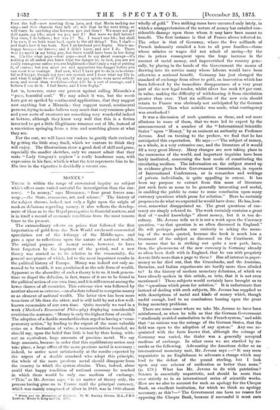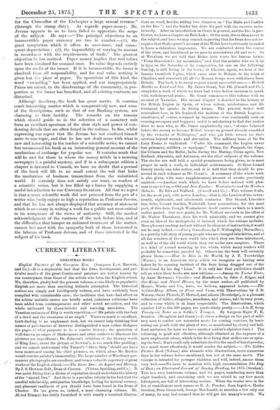MONEY.* TnEnE is within the range of economical inquiry no
subject which offers more varied material for investigation than the cur- rency. " In money," says Monunsen, " four great forces con- verge,—the State, commerce, art, and science." The history of the subject throws, indeed, not only a light upon the origin of modern delusions regarding money. it also reflects the develop- ment of ideas as to the Royal prerogative in financial matters, and is in itself a record of economic conditions from the most remote times to the present.
The extraordinary effects on prices that followed the first importation of gold from the New World awakened economical speculation out of the lethargy of the Middle-ages, and gave a spur to reflections upon the nature of national wealth. The original purpose of money seems, however, to have been forgotten by the inquirers of the period, and a new theory was started as to its relation to the community, the general acceptance of which, led to the most important results in the political history of Europe. Money was indeed not only as- sumed to be wealth, it was proclaimed as the sole form of wealth. Apparent as the absurdity of such a theory is to us, it took genera- tions to dispel the delusion, in fact, traces of it are to be found in the political action of our own time, and it is still current among the lower classes of all countries. This extreme view was followed by another almost as extreme,—an absolute refusal to recognise money as an element of national wealth. The latter view has been more tenacious of life than the other, and is still held by not a few well- known economists of our own time. Quite recently we read in a work (Macleod's Economical Philos,phy) displaying considerable erudition the sentence, "Money is only the highest form of credit." The adoption of a double standard is often urged as having a "comu pensatory action," by leading to the export of the more valuable coins on a fluctuation of value, a recommendation founded, we should say, upon the belief that little is lost by thus losing, with- out an equivalent, large amounts of precious metal. We say large amounts, because in order that this equilibratory action may take place, a large efflux of the more precious metal is necessary ; indeed, to arrive most satisfactorily at the results expected by the urgers of a double standard who adopt this principle, the whole of the more precious metal should disappear from the country in which the system obtains. Thus, indeed, alone could that happy condition of national economy be reached in which there would be only one medium of exchange. "This," as Mr. Jevons says, "is no matter of theory only, the process having gone on in France until the principal currency, which was mainly composed of silver in 1849, was in 1860 almost • Mosey and the Mechanism of Exeha7pe. By W. Stanley Jevons, ILA, F.R.S. London: Henry S. King and Co. 1375.
wholly of gold." Two striking cases have occurred only lately, in which a misapprehension of the nature of money has entailed con- siderable damage upon those whom it may have been meant to benefit. The first instance is that of France above referred to. The other is that of Germany, where the five milliards of French indemnity entailed a loss to all poor families—those whose salaries or wages did not admit of saving—by the rise in prices consequent upon the huge increase in the amount of metal money, and impoverished the country gene- rally, by placing in the hands of the Government the means of drawing into its service many whose labours would have been otherwise a national benefit. Germany has just changed the standard of exchange from silver to gold, an innovation which has been followed by the immediate disappearance of a very great part of the new legal tender, whilst silver has sunk 8.8 per cent. in value, making the difficulty of withdrawing it from circulation greater than ever. That six millions of the new coin should return to France was obviously not anticipated by the German Government. Then what mistake was made, what contingency was overlooked ?
It was a discussion of such questions as these, and not mere allusions to some of them, that we were led to expect by the announcement of a number of the " International Scientific Series" upon "Money," by so eminent an authority as Professor Jevons. And on turning to the preface, we find that he has anticipated this expectation. He says :—"The subject of money, as a whole, is a very extensive one, and the literature of it would fill a very great library. Many changes are now taking place in the currencies of the world, and important inquiries have been lately instituted, concerning the best mode of constituting the circulating medium. The information on the subject stored up in evidence given before Government Commissions, in reports of International Conferences, or in researches and writings of private individuals, is quite appalling in extent. It has been my purpose to extract from this mass of literature just such facts as seem to be generally interesting and useful, in enabling the public to come to some conclusion upon many currency questions which press for solution." Here he certainly proposes to do what we expected he would have done. He has, how- ever, somewhat disappointed us. The great questions of cur- rency are simply referred to. The work certainly contains a great deal of " useful knowledge " about money, but it is too de- sultory. Mr. Jevons tells us it is not a work upon the Currency question, "as-that question is so often discussed in England." He will perhaps pardon our curiosity in asking the mean- ing of the words quoted, because the book is much less a treatment of the subject as discussed on the Continent. If he means that he is striking out quite a new path, have, then, the phenomena of the new currency in Germany already so often been dealt with in England, that he can with propriety devote little more than a page to them ? Has all interest in paper- money so far died out, that the Greenbacks, and the Austrian, Bavarian, and Italian experiments are hardly more than alluded to? Is the history of modern monetary delusions, of which we have already spoken in this article, so trite, that it is not even mentioned ? These subjects would certainly have brought us to the " questions which press for solution." It is unfortunate that instead of dealing with such subjects, Mr. Jevons has supplied us with descriptions of metal and kinds of money which, though useful enough, lead to no conclusions bearing upon the great living monetary problems.
There are some cases where we take Mr. Jevons to have been misinformed, as when he tells us that the German Government "studiously avoided assimilation to the French system," and adds that "so various was the coinage of the German States, that the field was open to the adoption of any system." Any one ac- quainted with the facts knows that, although the coinage of Germany was varied, the thaler was a generally accepted medium of exchange. In other cases we are startled by re- marks as the following. Advocating the American dollar as an international monetary unit, Mr. Jevons says :—" It may seem unpatriotic in an Englishman to advocate a change which may lead to the defeat of the pound sterling, but I look upon any one scheme of unification as better than none." (p. 179.) What has Mr. Jevons to do with patriotism? Science is essentially unpatriotic, and should be more than ever strictly so in an international series of scientific works. How are we also to account for such an apology for the Cheque Bank, an excellent institution, for which we think no apology necessary, as this?—" The Government can have no reason for opposing the Cheque Bank, because if successful it must earn
for the Chancellor of the Exchequer a large annual revenue " (through the stamp duty). As regards paper-money, Mr. Jevons appears to us to have failed to appreciate the scope of the subject. lie says:—" The principal objections to an inconvertible paper currency are two in number,—(1), the great temptation which it offers to over-issue, and conse- quent depreciation ; (2), the impossibility of varying its amount in accordance with the requirements of trade." The greatest objection he has omitted. Paper money implies that real values have been obtained for nominal ones. Its value depends entirely upon the credit of the issuer. If it is inconvertible, the issuer is absolved from all responsibility, and for real value nothing is given but the piece of paper. To operations of this kind, the word "swindling" has been applied, and not inappropriately. Prices are raised, to the disadvantage of the community, in pro- portion as the issuer has benefited, and all existing contracts are disturbed.
Although desultory, the book has great merits. It contains much interesting matter which is comparatively new, and some of the descriptions, such as that of our Banking system, are charming in their lucidity. The remarks on the reasons which should guide us in the selection of a monetary unit form an excellent specimen of the clear style and power of con- densing details that are often found in the volume. In fine, whilst expressing our regret that Mr. Jevons has not confined himself more to one topic, and that he has not dealt more with what is new and interesting to the readers of a scientific series, we cannot but recommend his book as an interesting general account of the mechanism of exchange for popular use. It contains much that will be new for those to whom the money article in a morning newspaper is a painful mystery, and if in a subsequent edition a chapter is devoted to Consols, we have no doubt that a perusal of the book will lift to no small extent the veil that hides the mechanism of business transactions from the uninitiated world. It certainly does not satisfy our want, as readers of a scientific series, but it has filled up a hiatus by supplying a useful introduction to our Currency literature. All that we regret is that a more scientific work did not proceed from the pen of a writer who justly enjoys so high a reputation as Professor Jevons, and that he has not always displayed that accuracy of statement which is necessary in writing a work for a public not over-critical in its acceptance of the views of authority. Still, the modest acknowledgment of the vastness of the task before him, and of the difficulties that hamper an unbiased treatment of the matter, cannot but meet with the sympathy both of those interested in the labours of Professor Jevons, and of those interested in the subject of his book.



































 Previous page
Previous page